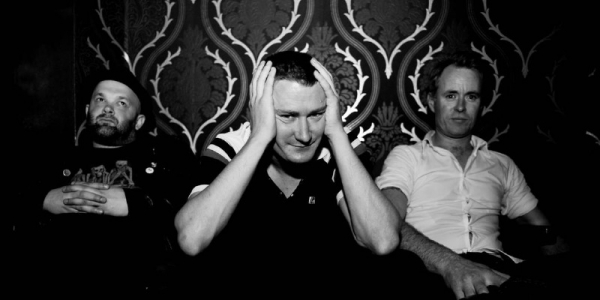Scott’s vague distrust of the human race isn’t just evident in his responses to CPR exercises however, it’s also apparent across his body of work – perhaps never more obviously so than on The Peep Tempel’s new record, Joy. Lead single Rayguns speaks of a “regime” of ice addicts, while Constable comes over like a Raymond Chandler novel stripped of hope.
But as far as Scott is concerned, there was something almost workman-like about the band’s approach to the album. “It’s just a record,” he says. “I think you go in and you set yourself the task of writing a record. You go in and do it, that’s the way it goes. It’s almost robotic in a sense, the actual process. We’ve gotten to a certain point now we’re ready to do it, so we go off and do it.”
Joy has its own distinct internal logic. Despite the record’s darkness, it comes with a significant jolt of humour too, and the manic, ever escalating Neuroplasticity is downright upbeat, albeit in a recognisably Peep Tempel-esque, off-kilter way. Yet, despite the album’s recognisable continuity, Scott argues the group rarely sets out with an overall picture of the finished product in mind.
“It’s strange when you’re writing,” Scott says. “I mean, a piece of magic happens, then you have to pull it apart until it becomes a song. You’ve got three different people and their perception of what’s going on is different. And then you have to define what’s going on without ever killing it.”
Ultimately, Scott argues the only way the songs survive the complicated and constrictive process of being nutted out is the band trusting the tune rather than that nebulous thing people call a ‘record’. “All the songs to me are so individual,” he says. “An album is just a collection of those songs, and the fact that you’re going into the same studio with the same band that’s what makes it an album. You create something that you enjoy and something you’re really happy with, and the album is almost like a by product of that.”
Of course, an album is also defined by something as simple as the order in which the songs appear, a necessity that Scott has previously considered to be an almost hindrance. “Track listings have always been the hardest thing, and the thing I’ve disliked most about making records,” he says.
“It’s strange. You go in there and you spend so much time on the album, and you go through so many different emotions. You have an amazing amount of joy and elation, and then you’ve got doubt and you start to lose trust in your own ears, and then you think it’s rubbish. Then the next day you think it’s great again. Then you have to sit down and put it in an order.”
Arranging the piece into some semblance of a structure is both an anticlimax and a stylistic fib then – though Scott says this time around the band was much more prepared for that particular hurdle. “We were thinking about it throughout the process,” he says. “This time, when it came to choosing an order, we got it done in an afternoon. We sat down with a couple of beers and sorted it out. There were a few disagreements, but on the whole I think everyone’s really happy with the way it turned out. I think that comes from getting older as well, because you’re always getting older,” he says.
Though Joy is now a finished, completed thing, Scott is at pains to stress that it’s also an organic entity, one that is far too easy to inadvertently crush to bloody death. “Every time, you think you’re going to make a better record,” Scott says.
“But it’s not just about the record. It’s about the whole process around it. You have to make sure that by the time you’re done with it and it’s time to tour it, you’re not in a position where you fucking hate it. We’ve certainly never mastered it, but it’s really interesting the way you develop throughout that process.”
Though it’d be foolish to get all Hollywood-ending about Joy – particularly given it’s a record from a band as un-Hollywood acerbic as The Peep Tempel – the thing that keeps Scott going is his band members. “Everybody in The Peep Tempel knows that the other person cares about the band, and cares about what happens, and that our creativity and our output is paramount,” Scott says. “We probably can’t even explain what it is in us that makes us want to do this. But it’s there. It’s in us, and we’ve just got to hold onto it really tight.”
BY JOSEPH EARP

